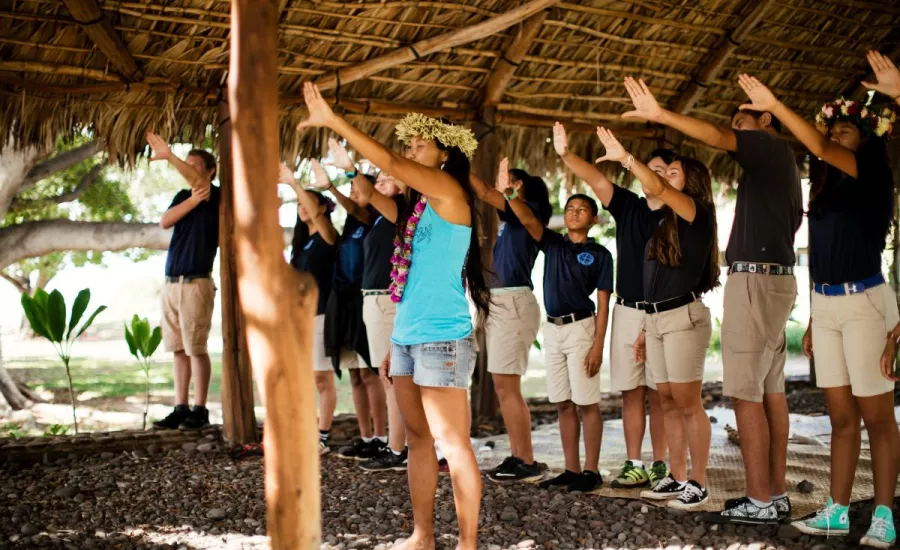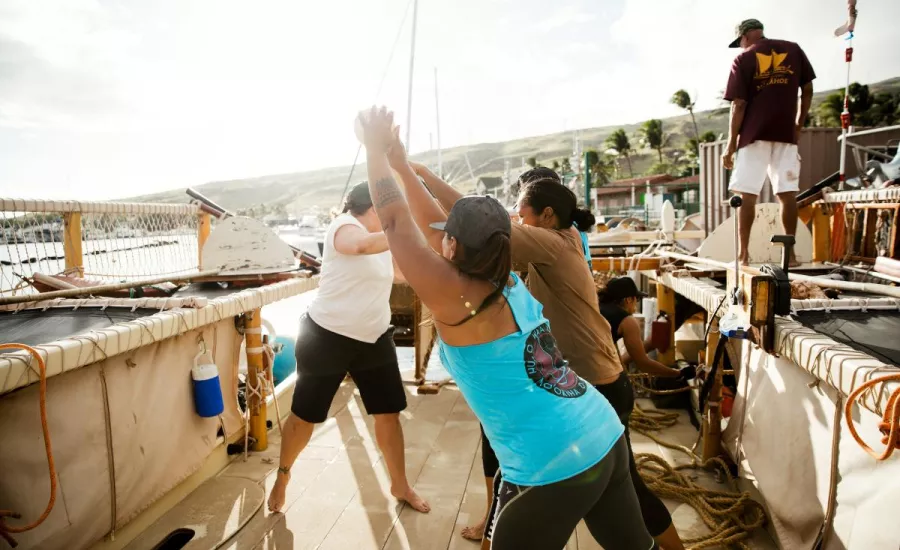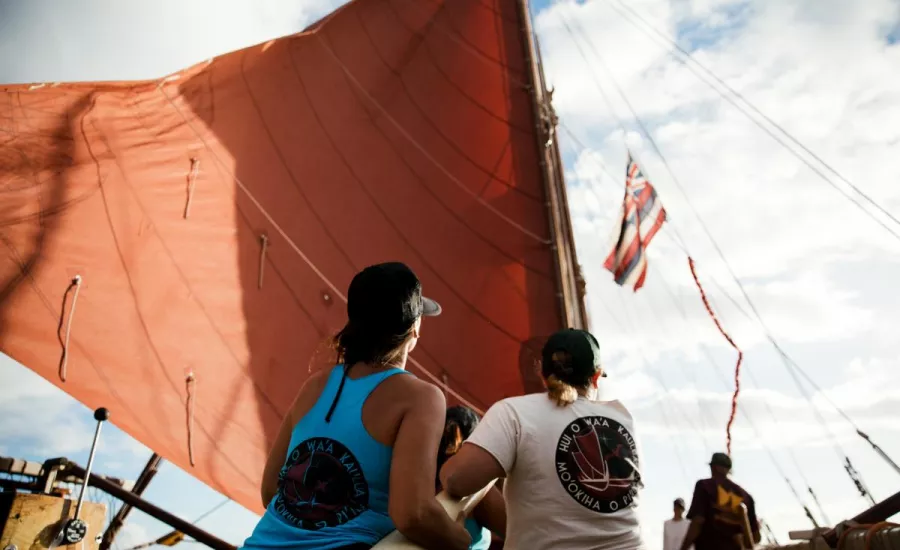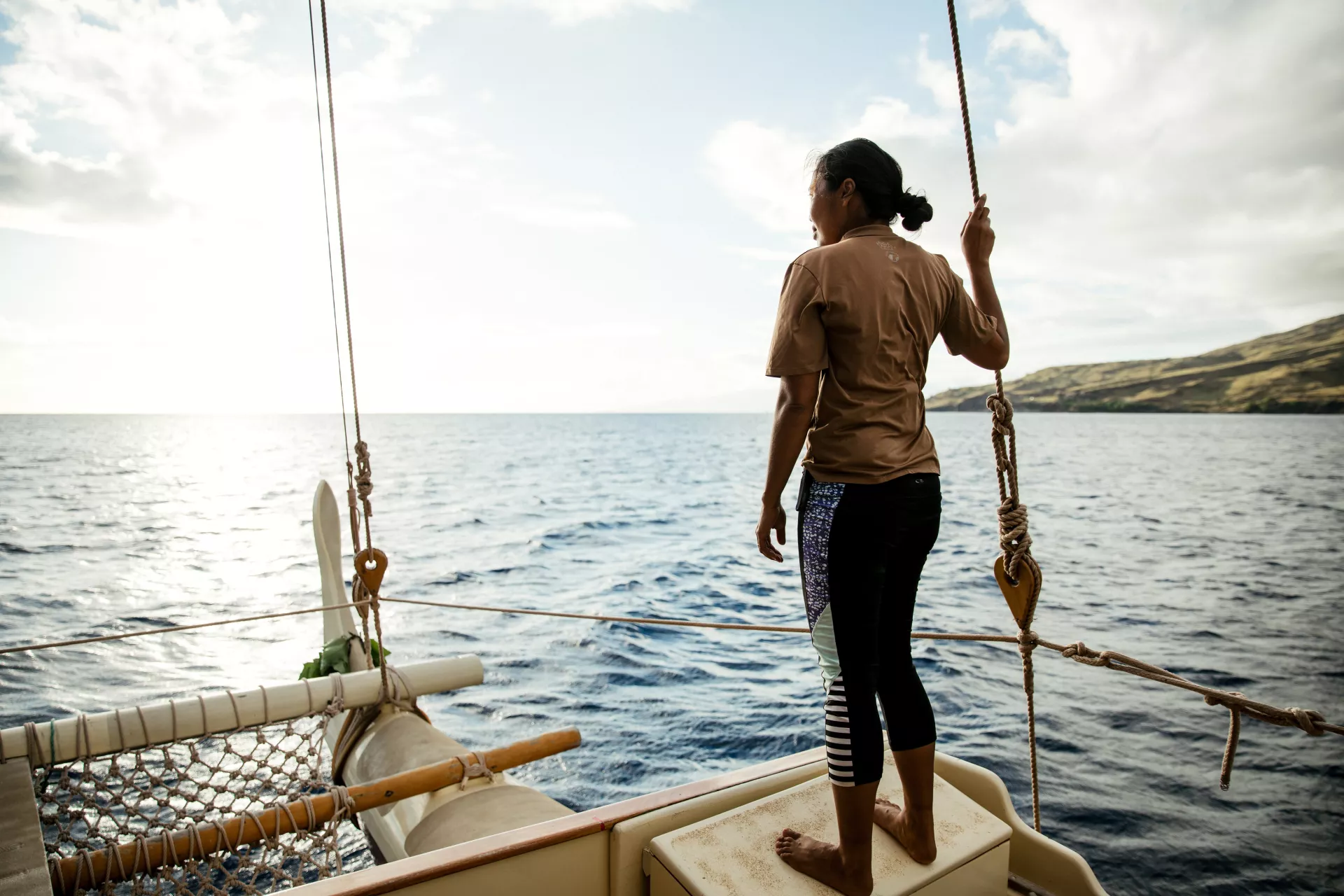Kala Tanaka
The stars shine bright above Maui. Kala Tanaka sits on the sand overlooking the ocean on the west side. Kala is a voyager and an educator at Hui o Wa‘a Kaulua, Maui’s Voyaging Society. When she stays on land for too long, she begins to long for the sea. But it hasn’t always been that way.
Kala’s father, Kalepa Baybayan, is a master navigator, and was one of the original crew members of the legendary Hōkūleʻa voyaging canoe. In 1976, the Hōkūleʻa travelled from Hawaiʻi to Tahiti, without modern instruments. That historic journey revived the art of voyaging, which was close to being forgotten in Hawaiʻi.
But Kala didn’t even go on her first sail until college. Her curiosity about voyaging led her to reach out to her father. In 2006, after a short sail from Oʻahu to Lāhainā, she was hooked. In 2017, a little more than 10 years from going on that first crossing, she crewed on the Hikianalia voyaging canoe from Hawaiʻi to Tahiti.
Tomorrow she’ll be back in Māʻalaea Bay on the canoe, Mo‘okiha o Piʻilani. It’s a boat she has a deep connection to, not only because she was there when the canoe was birthed, but because it’s the boat she teaches on for a new generation of voyagers.

“I feel my ancestors calling me in the clouds, in the rain, in the rainbows, in the birds. When we're getting close to home.”
How did you learn the art of navigating?
So, Papa Mau (Mau Piailug) was the master navigator that taught Nainoa Thompson, who taught my father, who in turn, taught me. When I first started sailing I wasn't forced to do it. My father let us do whatever we wanted to do. He said if I was going to voyage that I'd have to find my own way to the canoe. And that's what I did. My choice to be a voyager was my choice alone.
How did you fall in love with voyaging?
The stars have always been what have intrigued me from that first time I sailed. Even now, I’m still intrigued by the stars. There was something about navigating that grabbed me. It was that feeling that I – as a person, as a human being – can have this connection with my environment if I would just open myself up to listen to it.
Tell us about your relationship with your father.
My dad was pretty involved in sailing. I didn’t really feel like I had a strong relationship with him when we were growing up. When I got involved voyaging later, that’s when I felt like our relationship grew. I think we share a very special relationship because we’re able to sail together. But, I’m still his daughter. He scolds me a lot, but I can take it (laughs).
How does navigating without instruments work?
We memorize the rising and setting points of stars and use those to orient ourselves in our physical space so that we can navigate from place to place. I used to think that we would go to things. But that island out there was always there and all you’re doing in your place is you're making it come to you. It's the magic of navigation. The ocean swells, the wind, the fishes, the birds that are all out there – you may think that they exist independently, but there is a whole story, a whole dialogue that's happening and they're telling you where you are if you would just listen.

“But that island out there was always there and all you’re doing in your place is you're making it come to you. It's the magic of navigation.”
As a navigator, what’s your relationship with your canoe?
The canoe, the waʻa, is spiritual. It has its own mana (spiritual power). The canoe is a connector and it connects people and places together, things that you see and things that you cannot see. The canoe is our mother, the navigator is our father, the crew, we are all brothers and sisters. In that way we're just one family, all of us, and we rely on each other.
How does voyaging connect you to your ancestors?
My kūpuna had this deep connection with their environment and everything that surrounded them. So, I feel like when I’m voyaging that they’re with me. They’re on the canoe. And when I’m steering or navigating or looking at the sky or watching the sun, that’s our moment together. I’m feeling what they felt.
Why is wayfinding so important to Hawaiian culture?
Wayfinding is important because it's who we are, as voyagers, as Hawaiians, as oceanic peoples, that's who we are. It’s a deep, connection to everything that surrounds you. You and the sky, you and the birds, you and the sea – you’re not separated. You’re one.

Browse Hawaiʻi Adventures
Please note: We apologize for any inconvenience, but our preferred business listings below are in English only.

